Genome-wide reprogramming of the chromatin landscape underlies endocrine therapy resistance in breast cancer
- PMID: 23576735
- PMCID: PMC3631697
- DOI: 10.1073/pnas.1219992110
Genome-wide reprogramming of the chromatin landscape underlies endocrine therapy resistance in breast cancer
Abstract
The estrogen receptor (ER)α drives growth in two-thirds of all breast cancers. Several targeted therapies, collectively termed endocrine therapy, impinge on estrogen-induced ERα activation to block tumor growth. However, half of ERα-positive breast cancers are tolerant or acquire resistance to endocrine therapy. We demonstrate that genome-wide reprogramming of the chromatin landscape, defined by epigenomic maps for regulatory elements or transcriptional activation and chromatin openness, underlies resistance to endocrine therapy. This annotation reveals endocrine therapy-response specific regulatory networks where NOTCH pathway is overactivated in resistant breast cancer cells, whereas classical ERα signaling is epigenetically disengaged. Blocking NOTCH signaling abrogates growth of resistant breast cancer cells. Its activation state in primary breast tumors is a prognostic factor of resistance in endocrine treated patients. Overall, our work demonstrates that chromatin landscape reprogramming underlies changes in regulatory networks driving endocrine therapy resistance in breast cancer.
Conflict of interest statement
Conflict of interest statement: L.M. and M.L. hold a patent on the use of PBX1 and the NOTCH/PBX1-dependent gene signature presented in this paper for prognostic purposes to discriminate endocrine therapy-responsive from nonresponsive ERα-positive breast cancer patients.
Figures
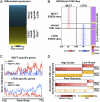
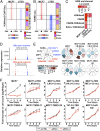
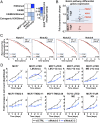
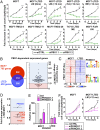
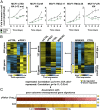
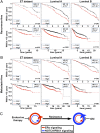
Similar articles
-
Chromatin landscape and endocrine response in breast cancer.Epigenomics. 2012 Dec;4(6):675-83. doi: 10.2217/epi.12.64. Epigenomics. 2012. PMID: 23244312 Review.
-
DMXL2 drives epithelial to mesenchymal transition in hormonal therapy resistant breast cancer through Notch hyper-activation.Oncotarget. 2015 Sep 8;6(26):22467-79. doi: 10.18632/oncotarget.4164. Oncotarget. 2015. PMID: 26093085 Free PMC article.
-
KLF17 attenuates estrogen receptor α-mediated signaling by impeding ERα function on chromatin and determines response to endocrine therapy.Biochim Biophys Acta. 2016 Jul;1859(7):883-95. doi: 10.1016/j.bbagrm.2016.04.009. Epub 2016 Apr 21. Biochim Biophys Acta. 2016. PMID: 27107895
-
Differential epigenetic reprogramming in response to specific endocrine therapies promotes cholesterol biosynthesis and cellular invasion.Nat Commun. 2015 Nov 27;6:10044. doi: 10.1038/ncomms10044. Nat Commun. 2015. PMID: 26610607 Free PMC article.
-
Mechanisms of endocrine resistance and novel therapeutic strategies in breast cancer.Endocr Relat Cancer. 2005 Dec;12(4):721-47. doi: 10.1677/erc.1.00857. Endocr Relat Cancer. 2005. PMID: 16322319 Review.
Cited by
-
Notch Signalling in Breast Development and Cancer.Front Cell Dev Biol. 2021 Jul 6;9:692173. doi: 10.3389/fcell.2021.692173. eCollection 2021. Front Cell Dev Biol. 2021. PMID: 34295896 Free PMC article. Review.
-
The histone demethylase enzyme KDM3A is a key estrogen receptor regulator in breast cancer.Nucleic Acids Res. 2015 Jan;43(1):196-207. doi: 10.1093/nar/gku1298. Epub 2014 Dec 8. Nucleic Acids Res. 2015. PMID: 25488809 Free PMC article.
-
The Functional Role and Regulatory Mechanism of Bromodomain-Containing Protein 9 in Human Uterine Leiomyosarcoma.Cells. 2022 Jul 10;11(14):2160. doi: 10.3390/cells11142160. Cells. 2022. PMID: 35883603 Free PMC article.
-
Kinesin family deregulation coordinated by bromodomain protein ANCCA and histone methyltransferase MLL for breast cancer cell growth, survival, and tamoxifen resistance.Mol Cancer Res. 2014 Apr;12(4):539-49. doi: 10.1158/1541-7786.MCR-13-0459. Epub 2014 Jan 3. Mol Cancer Res. 2014. PMID: 24391143 Free PMC article.
-
Embryonic Stem Cell (ES)-Specific Enhancers Specify the Expression Potential of ES Genes in Cancer.PLoS Genet. 2016 Feb 17;12(2):e1005840. doi: 10.1371/journal.pgen.1005840. eCollection 2016 Feb. PLoS Genet. 2016. PMID: 26886256 Free PMC article.
References
Publication types
MeSH terms
Substances
Associated data
- Actions
- Actions
Grants and funding
LinkOut - more resources
Full Text Sources
Other Literature Sources
Medical
Molecular Biology Databases

